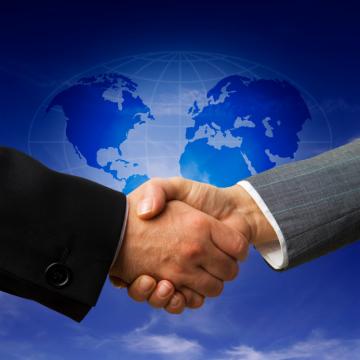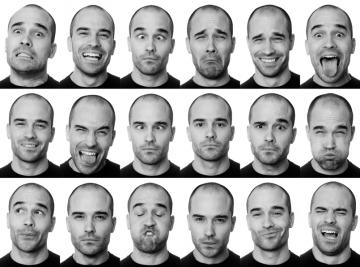
Why is it that when we meet someone, we shake their hand, when we’re proud of them, we give ’em a high five, and when we’re angry beyond words, we give ’em the finger? The answers may surprise you…
Shaking hands
Have you ever stopped to wonder why we shake hands to say “hello”? The tradition is a Western one, with likely origins in ancient Greece or the Middle East, where people have long shook hands as a way of making a pledge. This symbolic expression of pledging is thought to be the reason that, during a wedding ceremony, the bride and groom are asked to join hands as they recite their vows to one another.
Not all handshaking is so gentle, however. In Russia, the tradition of handshaking is more a form of male competition than intimate union. There, the handshake is sometimes taken to a painful, competitive extreme – a little like arm wrestling. Even in the United States, a firm handshake is often considered a sign of confidence and power.
The earliest handshakes may have been more practical than symbolic. As people from different tribes encountered one another, they may simply have been presenting their open hands to each other to demonstrate that they weren’t carrying any weapons!
Raising an eyebrow
Eyebrow-raising is a gesture with its roots in biology rather than social custom. Just as dogs raise their ears and horses flare their nostrils when they are most alert, human beings – who depend on sight more than sound or smell – tend to raise our eyebrows when we are surprised or suddenly called to attention. Not only do our eyebrows involuntarily go up, but our pupils dilate as well. Some scientists theorize that these responses are designed to help us get a better view of whatever has so suddenly caught our interest.
Of course, sometimes eyebrow-raising can be an intentional gesture, too. As such, it communicates both vulnerability and interest. And it’s one of the most common facial expressions used in flirting!
Kissing
So, who invented kissing? Some scientists theorize that the gesture has its origins in mothers feeding their babies by chewing up food and then transferring it, kiss-like, to their babies’ mouths. Not a very romantic image! Then again, the practice of kissing may have more lofty origins. In ancient Hebrew, the word for breath also means soul. There are indications that as early as 2000 BC, some cultures believed that bringing the mouths (or breath) together signified the joining of the two souls.
Ancient Egyptians seem to have been big fans of kissing if their art is any indication. Some scholars believe that they thought of kissing as the giving of breath, or “giving life.
The Romans are credited with turning the kiss into a sophisticated form of communication. The Romans kissed each other hello on the mouth or on the eyes, kissed robes, and kissed rings and statues of gods to indicate submission and respect. One Roman emperor sent a message about what he thought of other people by his choice of the body part that he allowed them to kiss. Important nobles were allowed to kiss his lips, less important ones kissed his hands and the least kissed his feet. The Romans had several different words for kisses: an osculum was a friendship kiss; barium was a passionate kiss, and a stadium was a deep kiss.
And in some African tribes, people honor their chief by kissing the ground he walks on!

Crossing your heart
Remember how you made a promise to your best friend in first grade? “Cross my heart and hope to die – stick a needle in my eye.” What was that all about? Well, crossing one’s heart, as well as crossing your fingers, has its origins in religious tradition. The crossing is a reference to “the cross” of Christ. As such, it’s connected to blessing – or invoking God as a witness to a promise you’re making. As part of worship, Catholics today still make the sign of the cross by first touching their hand to their forehead, then chest, and then left shoulder and righter shoulder – a gesture that looks quite a bit like crossing your heart.
Winking
A common nonverbal gesture in Europe and the United States, winking is an indication of a private understanding, a secret, or collusion of sorts. In Bodywatching (1985), Desmond Morris calls the wink a “directional eye closure.” By that, he means that the quickly closed and then opened eye is communicating a “secret aimed only at the person being looked at. The other eye is being kept open for the rest of the world, who are being excluded from the private exchange.”
Giving ’em the finger
Okay, is it obvious? Even the Romans used this gesture, calling it the digitus impudicus, or “digit without shame.” The suggestion is phallic aggression – but I doubt many people using this gesture stop to think much about what exactly it means.
Shrugging
Shrugging has been explained as the very opposite of a warlike posture. Instead of standing with shoulders squared, head upright, fists clenched, the shrugging person hunches the shoulders, tilts the head, and turns opened hands outward. The message is one of helplessness and retreat. Remember this: next time you’re in the middle of an important negotiation – don’t shrug!
Shaking your head
It took Charles Darwin, the guy who came up with the theory of evolution, to explain this one. Head-shaking is so nearly universal, Darwin thought that it must have biological origins. He claimed that nodding the head “yes” mimics the forward head nod of a baby seeking or attaching to his/her mother’s breast. And shaking the head “no”? That’s the headshaking gesture of a baby refusing the breast and/or food.
Crying
Animals don’t shed tears, except to wash irritants out of the eyes. So, why do we? Charles Darwin puzzled this one out, too. While he admitted that crying was a useful way for babies to get the attention of their caregivers, he was never able to find evolutionary usefulness for crying, or for tears. Finally, he hypothesized that someday humans would no longer cry.
Maybe he’s right. Maybe the day will come when we no longer have the need to cry. Or maybe we could just get past giving each other the finger.




